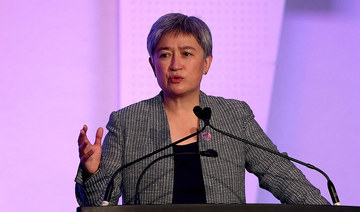WASHINGTON: US Republicans announced impeachment proceedings Wednesday against Joe Biden’s homeland security chief over the worsening border crisis, as they seek to cement immigration as a major issue in November’s presidential election.
Up to 10,000 migrants have been detained daily of late after crossing illegally from Mexico in what Republicans describe as a humanitarian disaster, while the White House and lawmakers have failed to agree on reforms to stem the influx.
Republicans in Congress, who concluded a probe into Homeland Security Secretary Alejandro Mayorkas in December, accuse the Democrat of creating a national security emergency by ignoring immigration policy.
No impeachment vote has been scheduled, but House Homeland Security Committee chairman Mark Green said an initial hearing would hold next Wednesday.
“Our investigation made clear that this crisis finds its foundation in Secretary Mayorkas’ decision-making and refusal to enforce the laws passed by Congress, and that his failure to fulfill his oath of office demands accountability,” he said.
A majority of the House would be required to vote that Mayorkas had committed “high crimes and misdemeanors,” prompting a Senate trial that would boot him from office if two-thirds of senators voted to convict.
That is seen as virtually impossible, however, as 51 of the 100 members in the upper chamber are Democrats.
The border issue unites the fractious Republican Party, but even in the House finding the votes for impeachment could still be a challenge, as the Republican majority has narrowed to just two votes.
Speaker Mike Johnson sought to galvanize the rank-and-file by taking around 60 members to the frontier town of Eagle Pass, Texas, on Wednesday, where they toured a border patrol facility and spoke to locals.
“Since the time that President Biden took office the administration has done next to nothing to protect the border. But we’ve all seen with our own eyes, they have opened the border wide to the entire world,” Johnson told reporters.
“It’s estimated that nearly 170 countries have people coming in and flowing across this border... And these are not people who are fleeing and looking for asylum that are in fear for their lives in their home countries.”
The proceedings will present a headache in an election year for Biden, who faces his own Republican-led impeachment inquiry over unfounded allegations of corruption, and whose low approval ratings on immigration are among his biggest weaknesses.
Just 38 percent of registered voters in a December Harvard CAPS-Harris poll said they approved of the Democratic president’s handling of immigration, down from 46 percent a month earlier.
Border agents said Tuesday a monthly record of 302,000 migrants were encountered by authorities after crossing illegally in December.
In Eagle Pass, Johnson called on Biden to reinstate the abandoned Trump-era “remain in Mexico” policy keeping asylum seekers out of the country until their court appearances, which he suggested would reduce illegal entries by 70 percent.
The Democratic National Committee accused Republicans of undermining efforts to boost border patrols and strike a deal on immigration, while the Homeland Security Department called the impeachment drive a “baseless political exercise.”
The Mayorkas announcement came with the White House and senators from both parties in talks on border security and asylum reforms, with Republicans conditioning aid to war-torn Ukraine on the passage of an immigration bill.
Negotiations have focused on tightening the rules for asylum seekers and expanding expedited removals, with both sides hoping to have a proposal to circulate next week.
Johnson has said he won’t accept anything less than the hard-line border and immigration bill passed last year by House Republicans, a non-starter in the Senate.
Texas governor Greg Abbott, a staunch Republican, has sought to take the immigration debate nationwide by sending thousands of migrants to Democratic-led northern cities.
Mayors in New York, Denver and Chicago have pressured Biden to take urgent action.
Abbott also signed a bill last month that would allow state police to arrest and deport migrants who cross illegally into the United States from Mexico.
The Justice Department filed a suit against Texas on Wednesday arguing that the bill known as SB4 is unconstitutional and only the federal government has the authority to regulate immigration.
Republicans push impeachment of Biden immigration chief
https://arab.news/2axe5
Republicans push impeachment of Biden immigration chief

- The Justice Department filed a suit against Texas on Wednesday arguing that the bill known as SB4 is unconstitutional and only the federal government has the authority to regulate immigration
Tighter asylum deportation rules take effect in Japan

- World’s fourth largest economy has long been criticized for the low number of asylum applications it accepts
- Revised law ‘meant to swiftly deport those without permission to stay, and help reduce long-term detentions’
The world’s fourth largest economy has long been criticized for the low number of asylum applications it accepts. Last year refugee status was granted to a record 303 people, mostly from Afghanistan.
Now the government can deport asylum seekers rejected three times, under immigration law changes enacted last year.
Previously, those seeking refugee status had been able to stay in the country while they appealed decisions, regardless of the number of attempts made.
The revised law is “meant to swiftly deport those without permission to stay, and help reduce long-term detentions,” justice minister Ryuji Koizumi said in May.
“Those who need protection will be protected, while those who violate the rules will be dealt with sternly,” he added.
Critics have raised concerns over the transparency of Japan’s screening process, warning that the new rules could heighten the risk of applicants facing persecution after repatriation.
“We’re strongly concerned that the enforcement of this law will allow refugees who have fled to Japan to be deported, and endanger their lives and safety,” the Japan Association for Refugees said on social media platform X.
The group called for a “fair” system to be established instead that “protects asylum seekers in Japan according to the international standards.”
As of May, more than 2,000 Ukrainians were living in Japan under a special framework that recognizes them as “evacuees.”
Australia PM condemns graffiti attack on US consulate in Sydney

- Building attacked and sprayed with paint by a person carrying a small sledgehammer at around 3 a.m. local time on Monday
- The same building was sprayed with graffiti in April, while the US consulate in Melbourne was graffitied by pro-Palestine activists in May
SYDNEY: Australian Prime Minster Anthony Albanese on Monday condemned vandalism of the US consulate in Sydney after the building was defaced in what local media said appeared to be a pro-Palestinian protest.
The building in the northern suburbs of Australia’s largest city was attacked and sprayed with paint by a person carrying a small sledgehammer at around 3 a.m. local time on Monday.
“I would just say that people should have respectful political debate and discourse,” Albanese said in a televised media conference from Canberra when asked about the incident.
“Measures such as painting the US Consulate do nothing to advance the cause of those who have committed what is of course a crime to damage property,” he added.
Nine windows of the consulate were damaged and the building’s door was graffitied, police said.
“CCTV has been sourced that shows a person wearing a dark colored hoodie with their face obscured carrying what appears to be a small sledgehammer,” a police spokesperson told Reuters by phone.
A spokesperson for the US consulate confirmed the building had been damaged but said staff and operations were unaffected.
“Australian Federal Police and New South Wales Police are investigating the incident,” the spokesperson said in a statement.
Photos of the consulate on the website of the Sydney Morning Herald newspaper showed inverted red triangles sprayed on the building’s front. The symbol is used by some pro-Palestinian activists, it reported.
The same building was sprayed with graffiti in April, while the US consulate in Melbourne was graffitied by pro-Palestine activists in May, according to the newspaper.
Long a stalwart ally of Israel, Australia has become increasingly critical of its conduct in Gaza, where an Australian aid worker was killed in an Israeli attack earlier this year.
Last month, camps sprang up at universities in Sydney, Melbourne, Canberra and other Australian cities protesting Israel’s war in Gaza and claiming the Australian government has not done enough to push for peace.
New Zealand PM says China Premier Li Qiang to visit this week

- Visit would be a valuable opportunity for exchanges on areas of cooperation between the two countries
WELLINGTON: New Zealand Prime Minister Christopher Luxon said on Monday that China’s Premier Li Qiang would visit the country later this week, in the first trip to the nation in seven years by a Chinese premier.
Luxon said in a statement he looked forward to warmly welcoming Premier Li in New Zealand and that the visit would be a valuable opportunity for exchanges on areas of cooperation between the two countries.
“The challenging global outlook makes it vital that we are sharing perspectives and engaging China on key issues that matter to New Zealand,” Luxon said.
Italy’s Premier Meloni gets domestic, European boost from EU election win

- Meloni’s Brothers of Italy party confirmed its status as the country’s most popular party
- The party is projected to get at least 23 seats in the European Parliament, up from six after the 2019 elections
ROME: Prime Minister Giorgia Meloni’s far-right party won European elections in Italy with a strong 28 percent of the votes, boosting her leadership at home and consolidating her kingmaker role in Europe.
Meloni’s Brothers of Italy party confirmed its status as the country’s most popular party, even improving its performance from the 26 percent it won in the 2022 general elections, according to projections by state broadcaster RAI based on almost 70 percent of votes counted.
The victory in Italy’s voting for European Parliament representatives provides a boost for Meloni, after almost two years in power, mainly at the expense of her governing partners in Rome.
In particular, Matteo Salvini’s hard-right League emerged as one of the biggest losers in the EU vote. After finishing first in the 2019 EU election, with more than 34 percent of the vote, the League got just 8.5 percent this time, behind its once junior ally, Forza Italia, which was over 9 percent.
For the opposition, the main center-left Democratic Party got 24.5 percent, followed by the populist Five Star Movement, which received only 10.5 percent, a seven-point decrease from the 2019 election.
Meloni, who personalized her electoral campaign betting on her personal “brand,” has now positioned herself as one of the most powerful figures in the EU, where far-right parties made major gains, dealing stunning defeats to two of the bloc’s most important leaders: French President Emmanuel Macron and German Chancellor Olaf Scholz.
“I’m proud that we are heading to the G7 and to Europe with the strongest government of all,” Meloni said, commenting on the electoral results at her party’s headquarters early Monday.
She called the outcome “extraordinary” and pledged to use it as “fuel” for the future.
Despite its solid popular support, Meloni’s conservative government needs a strong mandate to deal with the challenges ahead, especially given the fragile state of Italy’s public finances and the prospect of a difficult budget for 2025.
“I think that Meloni gets out of these elections stronger, first of all because this is a government that has not lost consensus, which is quite unique in Europe,” said Giovanni Orsina, director of the school of government at LUISS university in Rome.
“Secondly, with the growth of far-right parties, Meloni is in a pivotal position between the far right and the European People’s Party,” he added.
Based on the latest projections, Meloni’s party will get from 23 to 25 seats in the European Parliament, up from six after the 2019 elections, when it was only a minor opposition party.
Orban’s party takes most votes in Hungary’s EU election, but new challenger scores big win

- While Orban's Fidesz party has dominated Hungarian politics since 2010, many are deeply dissatisfied with how it has governed the country
- Emerging as Hungary's strongest opposition group is Péter Magyar's Respect and Freedom (TISZA) party, which took 31 percent of the vote
BUDAPEST: Hungarian Prime Minister Viktor Orban’s nationalist party appeared set to take the most votes in Sunday’s European Parliament elections, a race that pitted the long-serving leader against a new challenger that has upended Orban’s grip on Hungarian politics in recent months.
With 55 percent of votes counted, Orban’s Fidesz party had 43 percent of the vote, enough to send 11 delegates of Hungary’s 21 total seats in the European Union’s legislature.
While Fidesz took a plurality of votes, it was down sharply from 52 percent support in 2019 EU elections and looked set to lose two seats in what was widely seen as a referendum on Orban’s popularity.
Preliminary results showed that more than 56 percent of eligible voters cast a ballot, setting a record for participation in an EU election in Hungary.
While Fidesz has dominated Hungarian politics since 2010, many are deeply dissatisfied with how it has governed the country. A deep economic crisis and a recent series of scandals involving Fidesz politicians have rocked the party which prides itself on upholding family values and Christian conservatism.
Those factors led to the emergence of one of the most formidable challengers Orban has ever faced, Peter Magyar, who broke ranks with Orban’s party in February and in a matter of months built up Hungary’s strongest opposition party.
That party, Respect and Freedom (TISZA), stood at 31 percent of the vote Sunday, amounting to seven delegates to the European Parliament.

Magyar gathered a crowd of supporters next to the Danube River in Budapest on Sunday evening to await results. As strong storms approached the city, he addressed the crowd and encouraged them to take cover until the storm passed.
But he struck an optimistic tone concerning the election results, casting the day as a turning point in Hungarian politics, which have centered around Orban for more than 14 years.
“Althought we don’t know the results yet,” he said, “today is a milestone. I would like to ask everyone to remember this day well. On June 9, 2024, an era has come to an end.”
Magyar has planned to use the elections to propel himself and his movement to challenge and defeat Orban in the next national ballot scheduled for 2026. The 43-year-old lawyer’s accusations of widespread corruption in Orban’s government, and claims that Fidesz has used a “propaganda machine” to sow deep social divisions, have resonated with many Hungarians who desire change.
On the eve of the election, he mobilized tens of thousands of demonstrators in Budapest in a final appeal for support for his new party.
While the favorable result for TISZA portended a shift in Hungary’s domestic politics, right-wing populists like Orban made significant gains across Europe in the election, stirring fears that the world’s biggest trading bloc’s ability to make decisions could be undermined as war rages in Ukraine and anti-migrant sentiment mounts.
Hungary’s far-right Our Homeland party gained 6 percent of the vote Sunday, sending a delegate to Brussels for the first time.
Orban, the Kremlin’s closest EU ally, had expressed hopes that parties across Europe that oppose providing military support to Ukraine would gain a majority in the EU legislature.
Hungary is set to take over the EU’s rotating six-month presidency in July.
The five-time prime minister cast the elections as a contest that would decide whether Russia’s war in Ukraine would engulf Europe. He campaigned heavily on fears that the war could escalate to involve Hungary directly if his political opponents were successful.
He has blamed “pro-war” politicians in Washington and Brussels for increasing tensions with Russia and portrayed his refusal to supply Kyiv with military aid and other support as a “pro-peace” position unique in Europe.
After casting his vote earlier in the day, Antal Zámbó, a 75-year-old retiree in Budapest, said he supported Orban and Fidesz as he believed they would deliver “a more peaceful life.”
“Everyone benefits if there is peace in their surroundings as well as on the global stage,” he said.
A TISZA supporter, Gyula Nemet, 71, said governance by Orban’s party since 2010 has “not only proved that they are incompetent, but they totally divided this country.”
“Hungary has been pushed to the sidelines in Europe. We became totally segregated,” he said. “This cannot go on. We definitely need a positive change, integration with Europe and among the Hungarian people.”



















